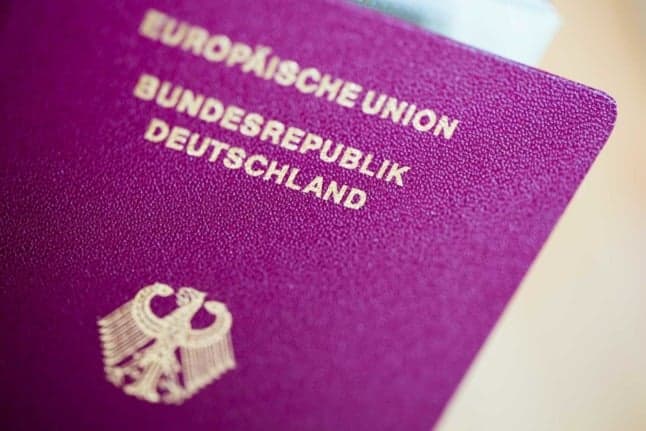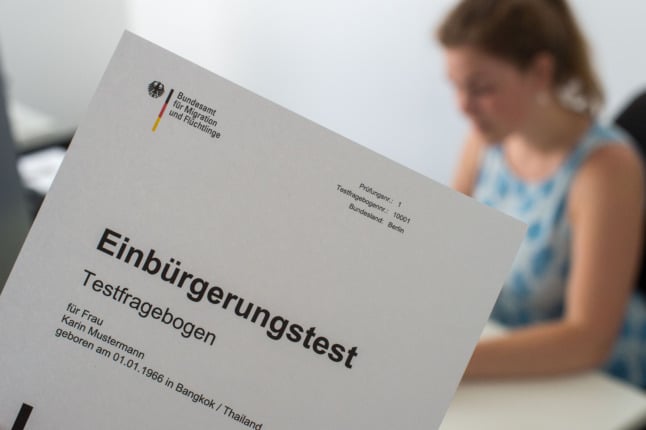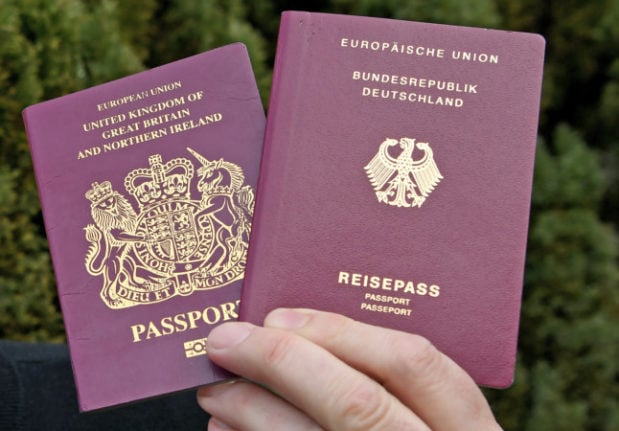EXPLAINED: What Germany’s new government means for citizenship and naturalisation

Reform to citizenship rules, including allowing for double citizenship, is one of the central planks of the new German government’s manifesto. Here’s what you need to know.
Germany’s new coalition government released its coalition agreement in November. It laid out its intention to “simplify the path to German citizenship” and move towards a modern citizenship law.
The agreement expressly states that it will allow for “multiple citizenships”, thereby relaxing existing rules which usually required people to give up their other citizenship if they wanted to become German.
While the specific parameters of the policy have not yet been set in stone, several details have emerged so far.
READ ALSO: Germany’s new coalition government to allow dual nationality
Here’s what you need to know.
What has the government announced?
In the lead up to the election, several parties had laid out plans for how to reform Germany’s citizenship rules.
The coalition government, which was sworn in on December 9th, said it had developed a suite of policies which would “create a new beginning in migration and integration policy that does justice to a modern immigration country”.
Significantly, the agreement states that the law will be changed to enable ‘multiple citizenships’, suggesting that the traffic light parties will permit dual nationality for non-EU citizens.
While holding dual nationality is permitted for citizens of other EU nations, for those from outside the bloc - generally known as ‘third-country’ citizens - this is only allowed in very narrow cases.
This is the realisation of a long-desired policy change by the Social Democrats, who have been held back from expanding dual citizenship by the CDU for the past 20 years.
This coincides with efforts at a state level to speed up administrative processes for gaining citizenship, for instance those in the capital Berlin.
READ ALSO: What you need to know about the current dual citizenship laws in Germany
What are the specific policy proposals?
Under the plan, children who are born in Germany will receive German citizenship if at least one of their parents have lived in Germany for at least five years.
The proposal also indicates that the language requirement for naturalisation among ‘guest workers’, i.e.
The agreement will also shorten the time frame for applying for naturalisation to only five years – or three years in the case of special integration achievements.

A woman completes the German citizenship test. Photo: picture alliance/dpa | Lino Mirgeler
Until now, non-Germans who are not married to a German could only apply for naturalisation after having continuous legal residence in Germany for eight years.
This could be reduced to seven years with completed integration course, or six years with German language skills better than level B1.
READ ALSO: EXPLAINED: How German citizenship differs from permanent residency
Easier process for the guest-worker generation
The coalition has also laid out their intention to make naturalisation easier for members of the so-called “guest worker” generation which helped to rebuild the country after the Second World War.
Guest workers were mainly Turkish workers from abroad who were recruited to work in industries such as agriculture, construction, steel, automotive and mining from the mid 1950s to early 1970s.
The agreement wants to “recognise the lifetime of achievements” of this generation, by lowering the language level that must be proven for this group, and by introducing a general hardship regulation for the required proof of language proficiency.
The coalition also intend to launch a campaign to inform people about the possibilities of acquiring German citizenship and to expressly welcome the holding of naturalisation ceremonies.
How will it work?
The exact details of how the new framework will operate have not been indicated expressly, however once it comes into force, people will no longer need to decide whether to give up their other citizenship when undergoing the process of naturalisation.
Currently, non-EU citizens who move to Germany and wish to obtain German citizenship are required to give up the citizenship they were born with, except for in a narrow minority of cases.

A dual British and German national holds up their passports. Under new rules, Brits will be able to take on German citizenship after living in Germany for five years. Photo: picture alliance/dpa | Holger Hollemann
They do this by ticking a box on their citizenship application form signally that they are willing to renounce all other nationalities.
Under the new framework, this box is likely to be removed, meaning non-EU citizens will be able to keep their third-country citizenship as well as acquiring German citizenship.
‘Repatriation offensive’: What about asylum, deportation and refugee status?
The coalition agreement also lays out policy changes regarding asylum, refugee status and deportation, with the new government saying they are committed to “fair, fast and legal” asylum procedures in Germany.
Put simply, there will be additional protections for people who cannot be deported, but deportation will be made easier for those who can be sent home.
People who have not been awarded a residency permit but cannot be deported - i.e. those who have had their asylum application denied but who cannot be sent home due to conditions in their home country, i.e. ongoing war - will receive an “opportunity residence permit” (Chancen-Aufenthaltsrecht) provided they have lived in Germany for five years, speak German, do not have a criminal record and are committed to the free and basic democratic order in German society.
This residence permit is probationary and will last for one year.
The agreement also includes a ‘repatriation offensive’, which will speed up deportations of people with criminal records or those deemed dangerous. German authorities came under fire after the Berlin Christmas Market attack in 2016 when it emerged that the Islamist attacker had avoided a deportation order.
Family reunification will also be expanded for refugees.
READ ALSO: What Germany's coalition proposals mean for citizenship and immigration
Please note, this report is intended as a guide only and should not take the place of legal advice from a qualified person.
Comments (1)
See Also
Germany’s new coalition government released its coalition agreement in November. It laid out its intention to “simplify the path to German citizenship” and move towards a modern citizenship law.
The agreement expressly states that it will allow for “multiple citizenships”, thereby relaxing existing rules which usually required people to give up their other citizenship if they wanted to become German.
While the specific parameters of the policy have not yet been set in stone, several details have emerged so far.
READ ALSO: Germany’s new coalition government to allow dual nationality
Here’s what you need to know.
What has the government announced?
In the lead up to the election, several parties had laid out plans for how to reform Germany’s citizenship rules.
The coalition government, which was sworn in on December 9th, said it had developed a suite of policies which would “create a new beginning in migration and integration policy that does justice to a modern immigration country”.
Significantly, the agreement states that the law will be changed to enable ‘multiple citizenships’, suggesting that the traffic light parties will permit dual nationality for non-EU citizens.
While holding dual nationality is permitted for citizens of other EU nations, for those from outside the bloc - generally known as ‘third-country’ citizens - this is only allowed in very narrow cases.
This is the realisation of a long-desired policy change by the Social Democrats, who have been held back from expanding dual citizenship by the CDU for the past 20 years.
This coincides with efforts at a state level to speed up administrative processes for gaining citizenship, for instance those in the capital Berlin.
READ ALSO: What you need to know about the current dual citizenship laws in Germany
What are the specific policy proposals?
Under the plan, children who are born in Germany will receive German citizenship if at least one of their parents have lived in Germany for at least five years.
The proposal also indicates that the language requirement for naturalisation among ‘guest workers’, i.e.
The agreement will also shorten the time frame for applying for naturalisation to only five years – or three years in the case of special integration achievements.

A woman completes the German citizenship test. Photo: picture alliance/dpa | Lino Mirgeler
Until now, non-Germans who are not married to a German could only apply for naturalisation after having continuous legal residence in Germany for eight years.
This could be reduced to seven years with completed integration course, or six years with German language skills better than level B1.
READ ALSO: EXPLAINED: How German citizenship differs from permanent residency
Easier process for the guest-worker generation
The coalition has also laid out their intention to make naturalisation easier for members of the so-called “guest worker” generation which helped to rebuild the country after the Second World War.
Guest workers were mainly Turkish workers from abroad who were recruited to work in industries such as agriculture, construction, steel, automotive and mining from the mid 1950s to early 1970s.
The agreement wants to “recognise the lifetime of achievements” of this generation, by lowering the language level that must be proven for this group, and by introducing a general hardship regulation for the required proof of language proficiency.
The coalition also intend to launch a campaign to inform people about the possibilities of acquiring German citizenship and to expressly welcome the holding of naturalisation ceremonies.
How will it work?
The exact details of how the new framework will operate have not been indicated expressly, however once it comes into force, people will no longer need to decide whether to give up their other citizenship when undergoing the process of naturalisation.
Currently, non-EU citizens who move to Germany and wish to obtain German citizenship are required to give up the citizenship they were born with, except for in a narrow minority of cases.

A dual British and German national holds up their passports. Under new rules, Brits will be able to take on German citizenship after living in Germany for five years. Photo: picture alliance/dpa | Holger Hollemann
They do this by ticking a box on their citizenship application form signally that they are willing to renounce all other nationalities.
Under the new framework, this box is likely to be removed, meaning non-EU citizens will be able to keep their third-country citizenship as well as acquiring German citizenship.
‘Repatriation offensive’: What about asylum, deportation and refugee status?
The coalition agreement also lays out policy changes regarding asylum, refugee status and deportation, with the new government saying they are committed to “fair, fast and legal” asylum procedures in Germany.
Put simply, there will be additional protections for people who cannot be deported, but deportation will be made easier for those who can be sent home.
People who have not been awarded a residency permit but cannot be deported - i.e. those who have had their asylum application denied but who cannot be sent home due to conditions in their home country, i.e. ongoing war - will receive an “opportunity residence permit” (Chancen-Aufenthaltsrecht) provided they have lived in Germany for five years, speak German, do not have a criminal record and are committed to the free and basic democratic order in German society.
This residence permit is probationary and will last for one year.
The agreement also includes a ‘repatriation offensive’, which will speed up deportations of people with criminal records or those deemed dangerous. German authorities came under fire after the Berlin Christmas Market attack in 2016 when it emerged that the Islamist attacker had avoided a deportation order.
Family reunification will also be expanded for refugees.
READ ALSO: What Germany's coalition proposals mean for citizenship and immigration
Please note, this report is intended as a guide only and should not take the place of legal advice from a qualified person.
Join the conversation in our comments section below. Share your own views and experience and if you have a question or suggestion for our journalists then email us at [email protected].
Please keep comments civil, constructive and on topic – and make sure to read our terms of use before getting involved.
Please log in here to leave a comment.